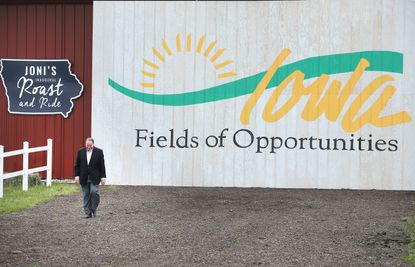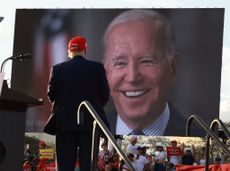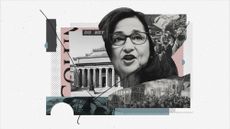Will 2016 finally kill Iowa's and New Hampshire's outsized political power?
It looks like it. But their powerbroker replacements are hardly an improvement.


Since the 1970s, Iowa and New Hampshire have played pivotal roles in who becomes president of the United States. Winners (and even runners-up) in these early voting states have used their strong showings to gain much-needed media attention and win over new donors to fuel their candidacies in the months ahead. Both Barack Obama and George W. Bush used victory in Iowa as a trampoline to national success.
The presidential race is a marathon. But without victories early on, few candidates have had the resources to compete until the end. That's why so many candidates drop out after a poor showing in the Iowa caucuses, as both Joe Biden and Chris Dodd did in 2008. Without the springboard of an early-state success, long-term victory becomes all but hopeless.
That might be changing. Indeed, it looks like Iowa and New Hampshire might be supplanted this year. The new presidential power brokers? Fox News and, to a lesser extent, the other television networks.
Subscribe to The Week
Escape your echo chamber. Get the facts behind the news, plus analysis from multiple perspectives.

Sign up for The Week's Free Newsletters
From our morning news briefing to a weekly Good News Newsletter, get the best of The Week delivered directly to your inbox.
From our morning news briefing to a weekly Good News Newsletter, get the best of The Week delivered directly to your inbox.
With at least 14 Republicans officially running for president, and at least two more on the way, Fox News has a plan to limit participation in the first GOP debate, scheduled for August 6. Only the top 10 candidates in an average of the national polls will be allowed to participate. You could be a U.S. senator or governor of a major state, but if you don't make the cut you don't get a podium on the stage.
This winnowing of the GOP presidential field — which is normally handled by the Iowa caucuses and New Hampshire primary — is instead being done by television and national polls instead.
As a result, the candidates are already dramatically changing their strategies to run a national primary campaign so that they do well in the national polls that will decide their debate fate. Instead of visiting Iowa diners and holding New Hampshire town hall meetings, the candidates are making sure they get on national television. For Republicans, this means Fox News.
Iowa Republicans have already canceled the famous Iowa Straw Poll due to lack of participation from the candidates. New Hampshire Republicans are reporting fewer visits to their state, especially from the national frontrunners.
There are other forces that have conspired to weaken the position of Iowa and New Hampshire, too.
The proliferation of super PACs, with their ability to take nearly unlimited campaign contributions from wealthy donors, has changed the motivations of candidates. Instead of using early primary wins to attract new donors, the candidates are spending more time courting the big donors that could fuel their campaigns for months. One big check from a billionaire can mean more than a hard fought victory in one of the early states.
Indeed, finishing in the top two or three of Iowa or New Hampshire is no longer considered necessary to be a viable candidate.
Allowing states like Iowa and New Hampshire an outsized role in determining the presidential candidates was never ideal. Both states are unrepresentative of the nation as a whole. But the system did allow a glimpse into how the White House hopefuls handled themselves in intimate campaign settings with real voters.
That's no longer possible if the presidential campaign is waged primarily in television studios and in closed-door fundraising events with wealthy donors.
Create an account with the same email registered to your subscription to unlock access.
Sign up for Today's Best Articles in your inbox
A free daily email with the biggest news stories of the day – and the best features from TheWeek.com
Taegan D. Goddard is the founder of Political Wire, one of the earliest and most influential political websites. He also runs Wonk Wire and the Political Dictionary. Goddard spent more than a decade as managing director and COO of a prominent investment firm in New York City. Previously, he was a policy adviser to a U.S. senator and governor. Goddard is also co-author of You Won — Now What? (Scribner, 1998), a political management book hailed by prominent journalists and politicians from both parties. Goddard's essays on politics and public policy have appeared in dozens of newspapers across the country, including The Washington Post, USA Today, Boston Globe, San Francisco Chronicle, Chicago Tribune, Philadelphia Inquirer, and Christian Science Monitor. Goddard earned degrees from Vassar College and Harvard University. He lives in New York with his wife and three sons.
-
 'Voters know Biden and Trump all too well'
'Voters know Biden and Trump all too well'Instant Opinion Opinion, comment and editorials of the day
By Harold Maass, The Week US Published
-
 Is the Gaza war tearing US university campuses apart?
Is the Gaza war tearing US university campuses apart?Today's Big Question Protests at Columbia University, other institutions, pit free speech against student safety
By Joel Mathis, The Week US Published
-
 DOJ settles with Nassar victims for $138M
DOJ settles with Nassar victims for $138MSpeed Read The settlement includes 139 sexual abuse victims of the former USA Gymnastics doctor
By Justin Klawans, The Week US Published
-
 Arizona court reinstates 1864 abortion ban
Arizona court reinstates 1864 abortion banSpeed Read The law makes all abortions illegal in the state except to save the mother's life
By Rafi Schwartz, The Week US Published
-
 Trump, billions richer, is selling Bibles
Trump, billions richer, is selling BiblesSpeed Read The former president is hawking a $60 "God Bless the USA Bible"
By Peter Weber, The Week US Published
-
 The debate about Biden's age and mental fitness
The debate about Biden's age and mental fitnessIn Depth Some critics argue Biden is too old to run again. Does the argument have merit?
By Grayson Quay Published
-
 How would a second Trump presidency affect Britain?
How would a second Trump presidency affect Britain?Today's Big Question Re-election of Republican frontrunner could threaten UK security, warns former head of secret service
By Harriet Marsden, The Week UK Published
-
 'Rwanda plan is less a deterrent and more a bluff'
'Rwanda plan is less a deterrent and more a bluff'Instant Opinion Opinion, comment and editorials of the day
By The Week UK Published
-
 Henry Kissinger dies aged 100: a complicated legacy?
Henry Kissinger dies aged 100: a complicated legacy?Talking Point Top US diplomat and Nobel Peace Prize winner remembered as both foreign policy genius and war criminal
By Harriet Marsden, The Week UK Last updated
-
 Trump’s rhetoric: a shift to 'straight-up Nazi talk'
Trump’s rhetoric: a shift to 'straight-up Nazi talk'Why everyone's talking about Would-be president's sinister language is backed by an incendiary policy agenda, say commentators
By The Week UK Published
-
 More covfefe: is the world ready for a second Donald Trump presidency?
More covfefe: is the world ready for a second Donald Trump presidency?Today's Big Question Republican's re-election would be a 'nightmare' scenario for Europe, Ukraine and the West
By Sorcha Bradley, The Week UK Published